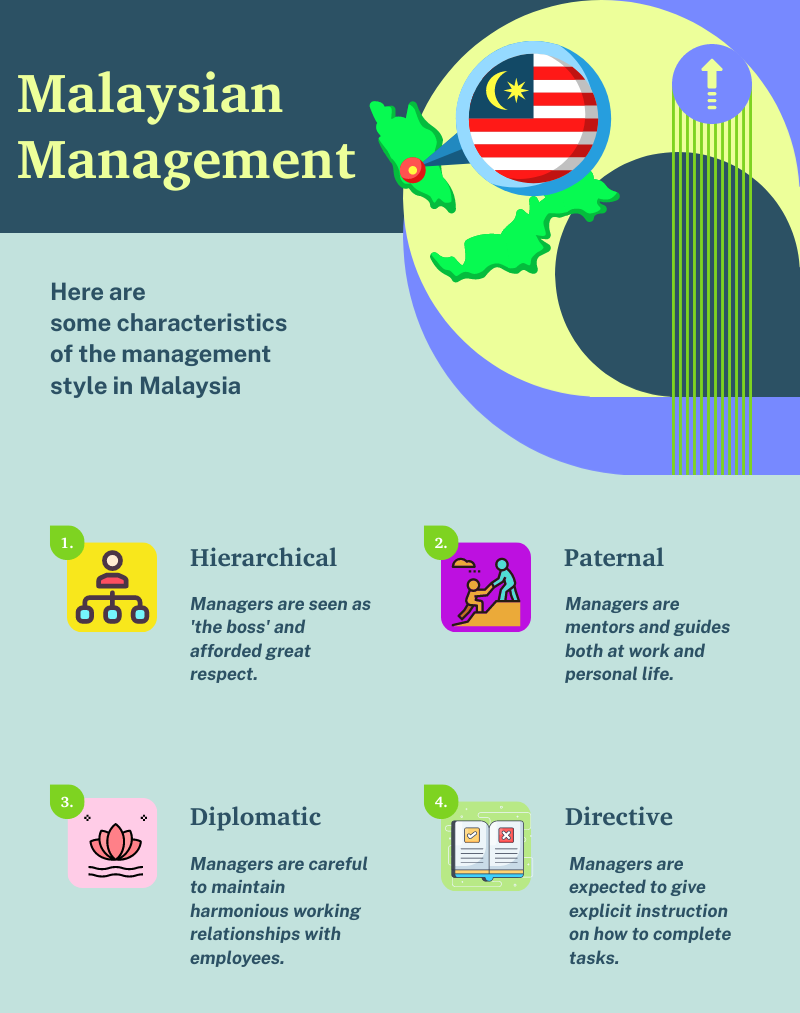
Cross Cultural Management Guide for Malaysia
The guide below is for managers who want to learn more about the management style and business culture of Malaysia.
It provides some useful information for managers who are relocating to the country for employment as well as those who may have Malaysian employees in their global or multicultural teams.
Topics include:
- Hierarchy
- Leadership style
- Time and scheduling
- Communication style and;
- Negotiation style
Management in Malaysia
The Malaysian management style is influenced by various factors, including cultural values, political and economic history, and social background. Generally, Malaysian management is hierarchical, with a strong emphasis on respect for authority and deference to those in positions of power.
- In recent years, there has been a shift towards more participatory and collaborative management styles in Malaysia, particularly in industries such as technology and finance.
- However, traditional hierarchical and paternalistic management styles still prevail in many sectors.
- There are often rules of behaviour governing specific business situations.
- Although this is changing, it is still common for employees to behave harmoniously and subjugate their desires to the needs of the group.
The Role of a Manager
Malaysian managers tend to be paternalistic, meaning they view their role as providing guidance and direction to their subordinates.
- They may demonstrate a concern for employees that goes beyond the workplace including involvement in their family, housing, health, and other practical life issues.
- This can lead to a more formal management style, with strict adherence to rules and regulations.
- However, Malaysian managers also value relationships and are often more concerned with maintaining harmony and consensus within the workplace
Approach to Change
Malaysia is seen to have a medium tolerance for change and risk.
- Innovations need to have a track record or history noting the benefits if they are to be accepted and implemented.
- One notable aspect of Malaysian management is the concept of "face," which refers to an individual's reputation, prestige, and social standing.
- Managers may prioritize maintaining face, both for themselves and their subordinates, which can impact decision-making and communication styles.
Approach to Time and Priorities
Malaysia is a fluid time culture. Locally they refer to it as "Rubber time" and, as is the case with many fluid time cultures, it is also very relationship-oriented. People in Malaysia will not want to upset others to force adherence to a deadline.
- When working with people from Malaysia, it’s advisable to reinforce the importance of the agreed-upon deadlines and how that may affect the rest of the organization.
- Global working means that some managers may have a greater appreciation of the need to enforce timescales and as such, agreed deadlines are more likely to be met.
Decision Making
Although the most senior people have absolute decision-making authority, they generally develop a consensus before making a final decision. This is especially true if several departments must work together to accomplish a goal.
- Although facts, statistics and logistics are important factors in making decisions, Malaysians can also be impulsive.
- When developing consensus, managers need to create context to allow employees to feedback effectively.
- When receiving feedback, employees are never criticized publicly; they are counselled in private in much the same way a father would speak to a child so for successful management some cultural sensitivity will be essential.
- Managers show a paternalistic concern for their subordinates. In turn, subordinates view looking good in the eyes of the manager as important since it indicates a good relationship.
Boss or Team Player?
If you are new to working in Malaysia, it is important that this is a multicultural society made up of ethnic Malays, Chinese and Indians. Depending on where you may be working, you could be working with a very multicultural group or a monocultural one. This will impact the degree to which a manager is seen as a boss or team player, as well as the industry or sector.
- Managers are generally concerned about losing face and as a result, are very careful and diplomatic.
- This risk becomes amplified in a team or collaborative setting, so if you would like to encourage participation it is essential first to clearly establish a non-threatening work environment and communicate fully that their participation is desired.
Communication and Negotiation Styles
Malaysian culture and society are based on etiquette and protocol. There is a proper way of doing things which foreigners need to understand and follow. The Malaysian communication style is indirect, soft and avoids conflict.
- Remain standing until told where to sit; the hierarchical culture has strict rules about rank and place at a table.
- Business discussions usually start after a fair amount of small talk and it takes time to develop a comfortable working relationship.
- You will need patience, perseverance and persistence.
- Decisions are reached by the person with the most authority; however, they will generally get a consensus first, which slows down the decision-making process.
- Saving face is important. If you lose your temper you lose face and prove you are unworthy of respect and trust.
- Malaysians may pause up to 20 seconds before answering a question; therefore, do not immediately start to speak or take their silence as agreement.
- Summarize and clarify points frequently during negotiations.
- Negotiations may continue after a contract has been signed since contracts are not viewed as cast in stone.
- Personal relationships are more important than written agreements.
Get an Expert's Support
Why not have your own two hour live webinar - customised to meet your unique needs - with one of our Malaysia experts?
They can help you navigate the business culture with ease.

 +44 0330 027 0207 or +1 (818) 532-6908
+44 0330 027 0207 or +1 (818) 532-6908

